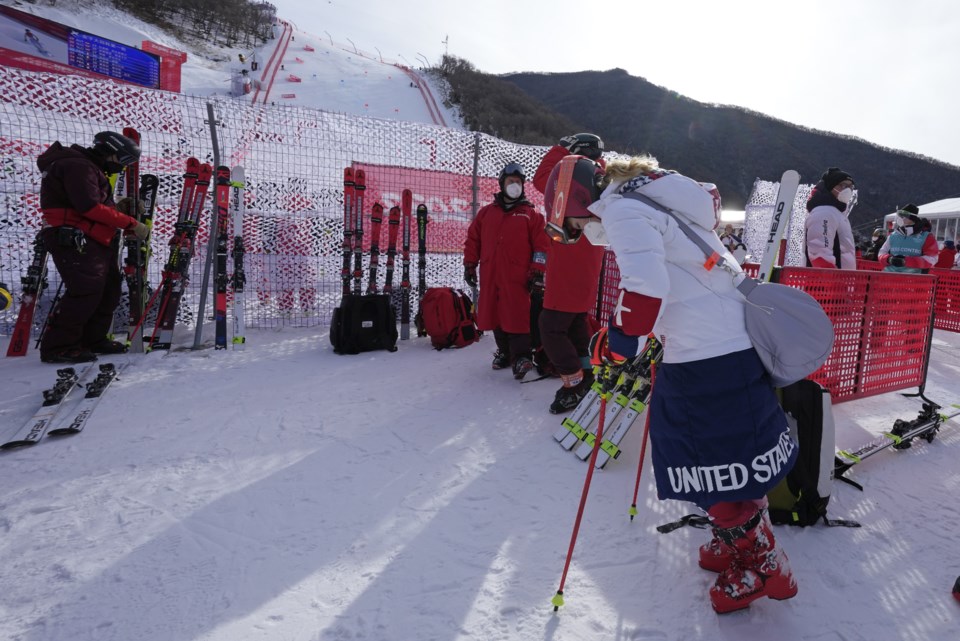BEIJING (AP) ŌĆö Mikaela Shiffrin will not soon forget what happened Monday in her first race of the Beijing Olympics. The poor transition that came five turns, and about 10 seconds, into the defense of her 2018 gold medal in the giant slalom. The skidding slide onto her left side. The missed gate that meant she was done so early in the opening run of a two-leg event.
The first ŌĆ£DNFŌĆØ ŌĆö ŌĆ£Did Not FinishŌĆØ ŌĆö next to her name on any GS result sheet in more than four years, a streak encompassing 30 races.
ItŌĆÖs not simply about how rare these mistakes are. ItŌĆÖs about the sting that sticks with her.
ŌĆ£I wonŌĆÖt ever get over this,ŌĆØ Shiffrin said, her voice steady, after slowly making her way to the bottom of a course known as The Ice River at the Yanqing Alpine Skiing Center. ŌĆ£IŌĆÖve never gotten over any.ŌĆØ
, a 26-year-old American who owns three Winter Games medals ŌĆö including a pair of golds ŌĆö along with three World Cup overall titles and six world championship victories.
The misses stand out.
She spoke about ŌĆ£how much it hurtŌĆØ and how ŌĆ£heartbreakingŌĆØ it was when she failed to complete a giant slalom on Jan. 23, 2018, in the Kronplatz World Cup stop at San Vigilio di Marebbe, Italy ŌĆö the last time she didn't complete a GS, which came three weeks before she won the gold at the Pyeongchang Games. She mentioned, too, a slalom error before those same Olympics. And a flub six years ago in another race.
ŌĆ£ThatŌĆÖs what drives me to try to keep working and improving, so I can try to make it (so) those things donŌĆÖt happen. But sometimes they still do happen and, unfortunately, it happened today,ŌĆØ said Shiffrin, who plans to be out there again Wednesday in the slalom, a race she won at age 18 at the 2014 Sochi Games. ŌĆ£I felt like there was a lot to look forward to, but, well, now we need to reset.ŌĆØ
The giant slalom was the first womenŌĆÖs Alpine race on the schedule in Beijing ŌĆö Shiffrin intends to enter all five ŌĆö and she was hardly the only racer to encounter trouble. The second run went on without her; in all, 19 of the 80 first-run starters failed to finish.
ŌĆö who leads the GS standings this season ŌĆö continued her recent run of success with the biggest win of her career later Monday, taking the gold with a two-run time of 1 minute, 55.69 seconds.
Federica Brignone of Italy added a silver medal to the bronze she claimed behind Shiffrin four years ago. Lara Gut-Behrami of Switzerland was third for her second Olympic bronze.
ŌĆ£ItŌĆÖs not easy, but I like when itŌĆÖs not easy,ŌĆØ Brignone said about the course conditions. ŌĆ£ItŌĆÖs not easy, because when you push too much, you slide. When you donŌĆÖt push, you slide.ŌĆØ
Marta Bassino of Italy, who won the World Cup giant slalom title last season and went two spots earlier than Shiffrin on Monday, fell on her left hip, slid down and spun around.
Shiffrin, who is from Colorado, was the seventh racer out of the start gate, lost control coming around a left-turn and later blamed ŌĆ£trying to push it,ŌĆØ describing her skiing as ŌĆ£almost anxious.ŌĆØ
She tried to right herself but could not.
Eventually, she propped herself up, stopped on the side of slope, stuck her poles in the snow and put her hands on her hips.
ŌĆ£ItŌĆÖs hard to know,ŌĆØ she said later, ŌĆ£how it would have gone the rest of the run. ... ItŌĆÖs like, ŌĆśWell, yeah, the day was finished, basically, before it even started.ŌĆÖŌĆØ
Shiffrin is as precise a skier as there is, someone who prides herself on making sure she gets all the way down the course, pushing just the right amount to be faster than everyone else while staying upright ŌĆö no easy task while sending yourself down the icy side of a mountain.
ŌĆ£That's the brutality of the sport: You can be as prepared as you want to and you still ski out in the fourth gate or the seventh gate or the 10th gate,ŌĆØ said Norwegian rival Ragnhild Mowinckel, who was fifth Monday after getting the GS silver in 2018. ŌĆ£Anyhow, I think (Shiffrin) will rise up again and she will probably nail the slalom and the other disciplines.ŌĆØ
After her tumble, Shiffrin spoke to her boyfriend, Norwegian skier Aleksander Aamodt Kilde, who finished fifth Monday of Switzerland.
ŌĆ£Of course itŌĆÖs a pity to ski out early in the race, but thatŌĆÖs also part of the game," Kilde said. ŌĆ£She tried and she went for it 100%.ŌĆØ
ŌĆö her own, of course, and those of fans, but also coaches, friends and family. She is upfront about the burden of dealing with , Jeff, two years ago.
Not long after ShiffrinŌĆÖs competitive day was done far sooner than expected, she got a hug from her mother, Eileen, who serves as one of her coaches, then headed back out to do some training for the slalom.
Shiffrin still should have a handful of chances over the next two weeks to become the first Alpine ski racer from the United States to win three Olympic golds across a career.
ŌĆ£IŌĆÖm not going to cry about this,ŌĆØ she said Monday, ŌĆ£because thatŌĆÖs just wasting energy.ŌĆØ
___
AP Sports Writer Daniella Matar and AP National Writer Howard Fendrich contributed to this report.
___
More AP Olympics: https://apnews.com/hub/winter-olympics and https://twitter.com/AP_Sports
Andrew Dampf, The Associated Press


